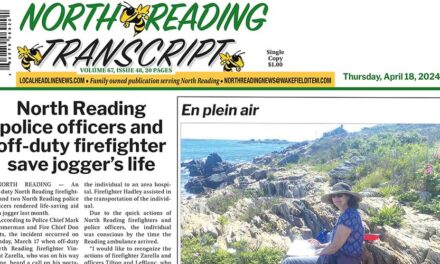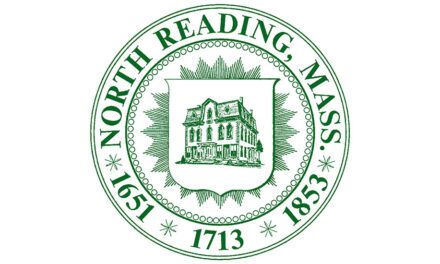Published in the April 7, 2016 edition
By DAN TOMASELLO
NORTH READING — The School Committee and 26 members of the public who attended the public hearing on the proposed fiscal year 2017 school budget agreed the proposed fee hikes for next year are the result of a lack of state aid.
Superintendent of Schools Jon Bernard and Finance Director Michael Connelly have proposed a $28,665,689 school budget for FY’17, representing a 4.3 percent increase ($1,70,615) over the current budget of $27,495,074. Connelly said the school department is currently facing a budget gap of $350,440.
Connelly said the proposed school budget includes 6.0 new full-time equivalent (FTE) positions, totaling $334,526.
The FY’17 school budget proposal includes 3.0 FTE positions for special education, totaling $148,934. School officials have requested a 1.0 FTE special education teacher for the middle school’s pathways program, totaling $61,864. School officials have also requested a 1.0 FTE special education teacher for the high school’s connections program, totaling $61,864. The high school is requesting a 1.0 inclusion paraprofessional for the connections program, totaling $25,206.
Connelly said if the special education positions are not included in the final FY’17 school budget, students in those programs will likely be placed outside of the district, at great expense to the town.
The School Committee identified three positions for the NRPS 2021 strategic plan as being a high priority for the school system. The positions are a 1.0 middle school psychologist ($61,864), a 1.0 special education teacher ($61,864) and a 1.0 academic teacher for North Reading High School ($61,864).
The finance director said 83.7 percent of the proposed FY’17 school budget is allocated for salaries. He said the school system’s per pupil spending is $14,137, which is slightly below the $14,920 state average.
“We are certainly not overspending in North Reading,” said Connelly.
School Committee member Jerry Venezia noted the school system’s contractual obligations for FY’17 include 2 percent raises for staff members across the district as well as step increases for teachers. He said the teachers’ contract the School Committee approved last year includes a revamped salary schedule.
“It’s not at the top and it’s not at the bottom,” said Venezia. “It’s competitive to the benchmark communities we compare ourselves to. Our salaries are competitive, but not excessive.”
School Committee Vice Chairman Mel Webster agreed.
“If you look at surrounding districts, we are in the middle,” said Webster.
Fee hikes
In order to balance the school budget, Connelly said school officials proposed raising busing, athletic and extra curricular fees as well as instituting a $200 bus fee for high school students. He said the fee increases would generate $127,000 in revenue for the school system.
“We certainly do not want to raise fees,” said Connelly.
School officials proposed raising the extra curricular fee for middle and high school students from $125 to $200, which would raise $27,000 in revenue. Connelly said the extra curricular fees allow students to participate in as many clubs as students choose.
Additionally, Connelly said the proposed student parking fee of $200 would raise an additional $45,000 in revenue. He said there are other school districts in the state that have implemented parking fees.
Connelly said the proposed athletic user fee hike for students playing a third sport would increase from $100 to $200 and the family cap would increase from $1,200 to $1,300. He said the proposed athletic fee increase would raise $10,000 in revenue. The school department’s current athletic fees for the first sport ($400) and second sport ($200) would remain the same.
The finance director said the FY’17 school budget also includes a component of raising bus fees due to the school department’s new bus transportation contract, which was higher than school officials hoped. The proposal entails increasing the individual student bus fee from $300 to $400, and the family cap from $500 to $650. Connelly said the bus fees would generate an expected $45,000 in revenue to offset the bus contract increase for students who pay for busing.
Connelly said one of the main reasons why the proposed fee hikes are on the table is because state aid, particularly Chapter 70 funding, is “flat.”
“North Reading has not had a sizable increase in state aid since 2010,” said Connelly.
Webster agreed with Connelly’s sentiment. He noted North Reading is considered to be a wealthy community by the state, which is one of the reasons why school officials are expecting to see only an incremental Chapter 70 increase in FY’17.
“The additional Chapter 70 funding we got from the state this year is $20 per student,” said Webster. “It equals about $49,000 in the end. So the state is basically saying we will give you $49,000 to pay for 2 percent salary increases. It’s impossible. Until the state restructures Chapter 70, we are going to be in the same rut every year. If the state gives us another million dollars or half a million dollars, we wouldn’t have this stress every year.”
Higher fees unpopular with parents
Eric Evans, 3 Sandra Lane, said he opposes the student parking fee because it “unduly burdens” high school students. He said he would be supportive of additional fees at the elementary schools such as a digital learning fee.
“It might be a good way to raise the revenue,” said Evans.
Deerfield Place resident Laina Simone, who is running for School Committee in the town election, disagreed with Evans’ proposal to charge more fees at the elementary schools.
“I don’t agree with the parking fee, but the one thing we have to keep in mind is that the elementary parents spend a lot of money and the elementary PA’s (parent associations) bring in a ton of money,” said Simone.
Marblehead Street resident Shari Riley, who works as a paraprofessional at North Reading Middle School, said she opposes the high school parking fee.
“It’s astronomically ridiculous,” said Riley. “You just can’t go from zero to $200.”
Webster said he is planning on making a motion at the School Committee’s next meeting on Monday to eliminate the parking fee proposal. If the parking fee is nixed, the school budget gap will increase to $395,440.
“We are going to have to find that $45,000,” said Webster. “I don’t think we should be charging parking fees. With the other fees, you are getting something. But with this, you are getting a slab of pavement.”
School Committee member Cliff Bowers agreed.
“None of us want it,” said Bowers. “I have been against all of the fees since I have been on the School Committee for the last eight years. There should be no fees in public education.”
Riley also accused the school department of underpaying paraprofessionals.
“We are being paid less than all of the surrounding areas,” Riley said.
Venezia said the School Committee “would be glad to deal with that” once contract negotiations with paraprofessionals begin in a couple of years.
In response to a question about special education costs from Scott Buckley, Webster said the four special education positions are needed to keep students in the school system.
“It’s a double edged sword,” said Webster. “If we don’t spend the $150,000 for the two teachers and the paraprofessional, we are going to have to spend $350,000 to send students outside of district instead of keeping them in. But we are getting nothing from the state for investing the $150,000 internally.”
Jerrilyn Rinaldi, 7 Bishops Way, inquired about what methods local officials have undertaken to push for Chapter 70 reform.
Bowers said the School Committee, Board of Selectmen and Finance Committee approved a resolution from the Suburban Coalition urging the State Legislature and Governor Charlie Baker to fully fund the recommendations of the Massachusetts Foundation Budget Review Commission. He said boards representing between 80 and 100 communities have signed on to the resolution.
“The idea is to pressure as many representatives and senators as possible, but it’s a lot like pushing a thin wet rope,” said Bowers. “We need to push them to do something.”
Venezia also noted the Finance Planning Team discussed the lack of Chapter 70 funding with State Representative Brad Jones and a representative from State Senator Bruce Tarr’s office recently.
“They were given an earful about our situation,” said Venezia.
Tracy Conlon, 7 Sandra Lane, said she supports adding the three special education positions in the proposed FY’17 school budget, but said she opposes the NRPS 2021 additions.
“I don’t think we can afford them right now,” said Conlon.
Bernard said two NRPS 2021 positions, the psychologist and special education teacher, are needed to meet students’ needs. He said adding the psychologist would lead to lower costs down the road. While he said the high school teacher is an “outlier,” Bernard said the position is needed to reduce class sizes.
“We believe there are too many classes with too many students in them at the high school,” said Bernard.
Marci Bailey, 21 Duane Dr., said the additional high school teacher is needed.
“With the high class sizes, a single high school teacher can impact over 100 students per day,” said Bailey.
Susan Regan, 5 Lindor Rd., said the extra curricular fee hike is a “huge increase.”
“I think a more reasonable increase would be more fair,” said Regan.
Bernard said there was “no methodology” to the extra curricular fee aside from closing the budget gap. He said the reason why the fee increases are included in the proposed school budget is to “preserve the classroom.”
“We don’t like any of the fees,” said Bernard. “We are turning over every rock to see where we can be creative, but at the same time maintain high quality educational programs for every student. If those fees are not adopted and additional revenues don’t come forward from the town, we are going to be looking at personnel. If additional revenues are not realized, we are going to have to make some sad and difficult decisions.”




